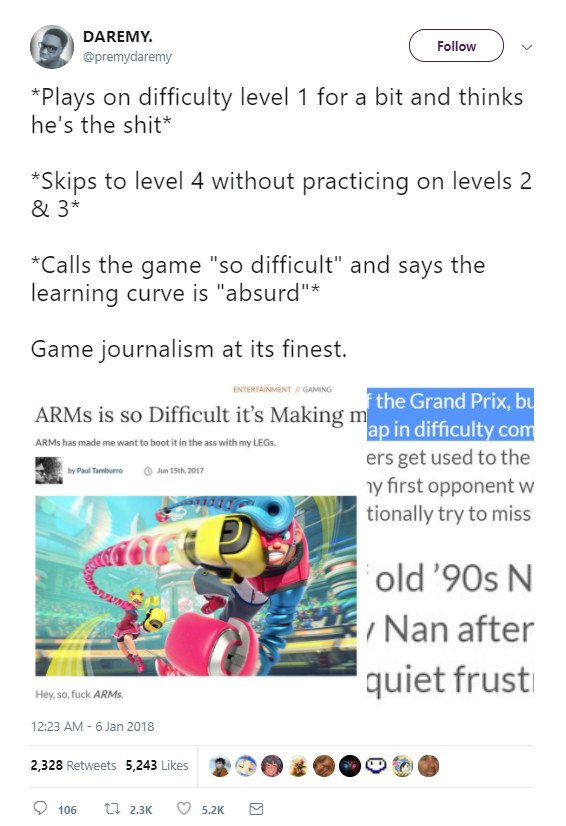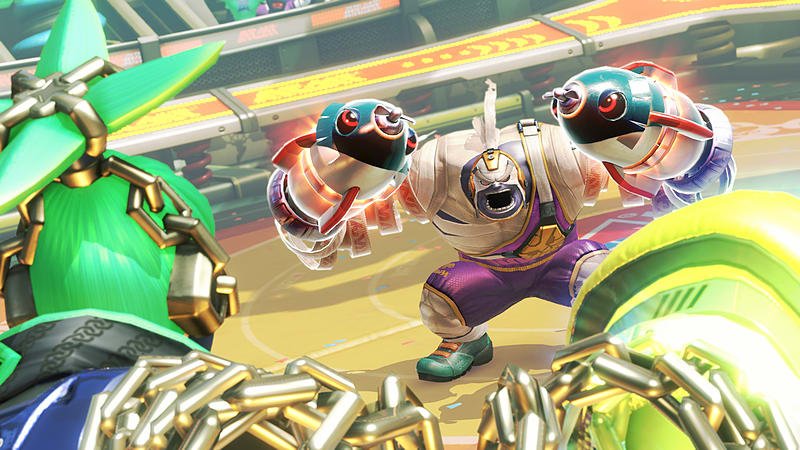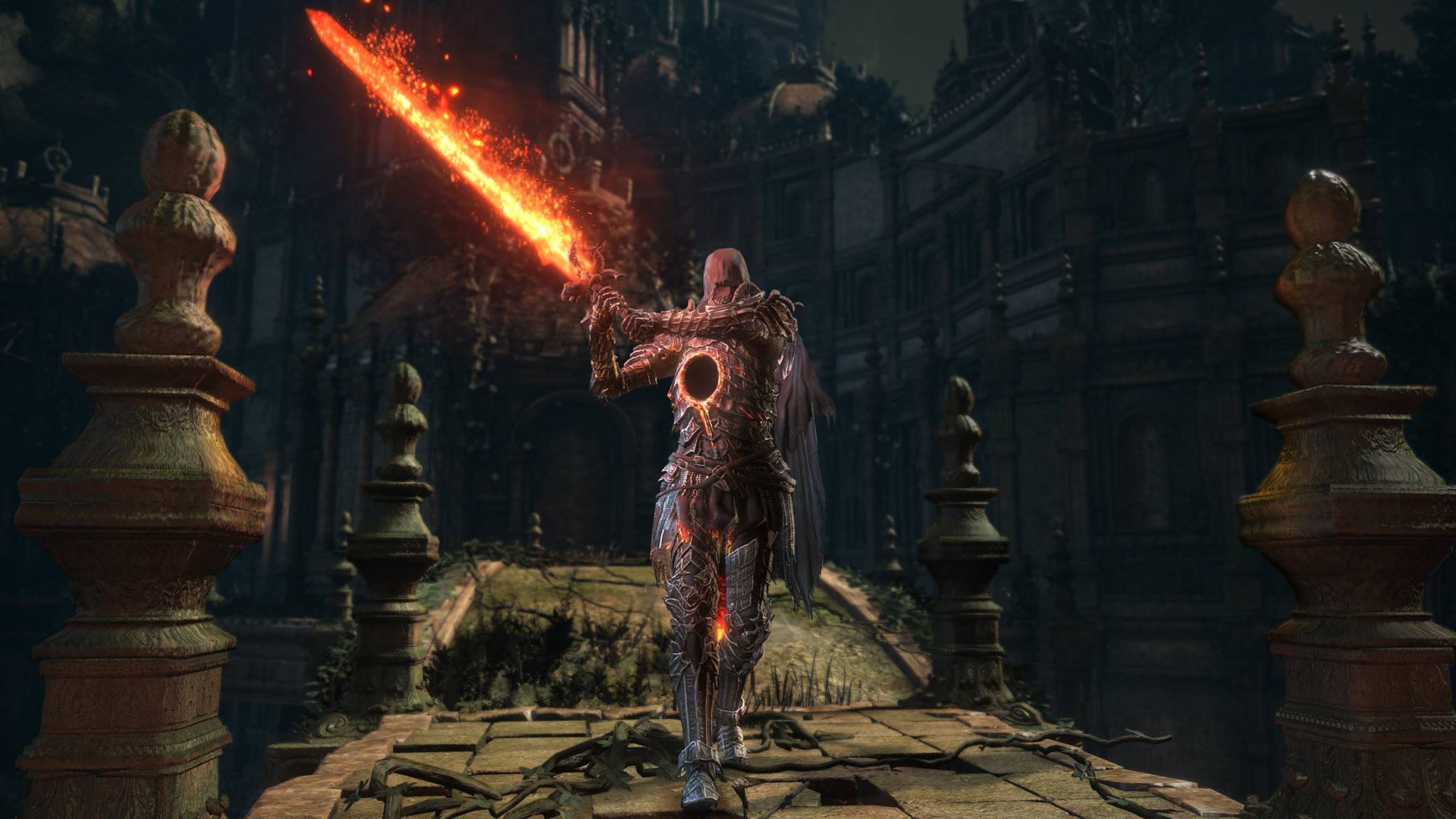When you have a reasonable amount of followers or your career is rooted in online media, your phone blowing up with notifications leads to the following reaction: “Ah shit, what did I do this time?”
Last weekend I was inundated with messages as a result of a tweet that did the rounds criticizing an old article of mine, in which I discussed the difficulty of Nintendo’s fighter ARMs. In the article, I explained how ARMs’ “absurd” difficulty curve was so tough it made me want to kick it up the arse with my LEGs. “I haven’t attempted to play level 2 or 3 of the Grand Prix, but I assume that some shit must have gone down in them because level 4 is a mighty steep leap in difficulty compared to level 1,” I wrote. You can read the full piece here.

The article didn’t get much traction when it was first published, but on Sunday (which is supposed to be a day of rest, y’know) a lot of people were belatedly annoyed at me for documenting my struggles with the game. Some were incredulous that I’d jumped from level 1 to 4 and hadn’t anticipated such a big leap in difficulty. Why didn’t I just complete level 2 and then level 3 before taking on level 4? Why did I naturally assume that level 4 of 7 would be the medium difficulty setting? What is wrong with me?
I understand that games journalists are about as popular as Ebola these days, but this ongoing debate surrounding whether or not they should be “good” at games bemuses me, precisely because there is no real metric to determine what makes someone “good” at a video game.
For example, if you’re a relatively frequent League of Legends player and consider yourself fully qualified to comment and critique changes Riot makes to the MOBA, your competency and the validity of your arguments could be thrown into question by someone who’s clocked 1,000+ hours into the game. Allowing criticism based solely on how good/bad someone is at playing a particular video game is a slippery slope because there are always going to be people who are much more skilled than you, who could undermine your criticisms just as much as you could undermine someone else’s.

On top of this, allowing for a broader range of perspectives is more valuable to readers, as a helpful review will allow them to determine whether or not a particular game is to their individual tastes. You may have been a die-hard Dark Souls fan who couldn’t wait for Dark Souls 3 and wanted to read reviews from similarly besotted fans of the series, or you might have been a relative newcomer who was put off by its combat but intrigued by its lore. There should be room for critics who tick both boxes, and not just a slew of opinions from reviewers who have played and enjoyed each game in the series.
Metacritic has a lot to answer for when it comes to reinforcing the belief that reviews should be homogenous. By whittling down dozens of critics’ experiences to one aggregated number, the site may make for an easier read for the consumer, but it doesn’t adequately reflect the variables of each critics’ experience. With readers now linking Metascores to a game’s chances of success, outliers who either reviews games “too low” or “too high” are placed under scrutiny — how could this one reviewer brand this clear 9/10 game a 7/10?
Such importance placed upon reviews scores means valid criticisms are routinely lost among controversies revolving around their impact upon Metacritic. This ensures that if a critic had an experience with a game that wasn’t comparable to other reviews — say, they found it too difficult for their tastes — then this opinion is used as evidence of why they shouldn’t have reviewed it in the first place.

My article about ARMs wasn’t an indictment of the game (or even a review of it), but rather a look at its steep difficulty curve and my surprise at being unable to clear it. Jumping from the easiest mode to the presumed medium difficulty mode, which ranked play is locked behind until it is beaten, is something that would have echoed many readers’ experiences. The vast majority of video games revolve around presenting a challenge to the player, so having a range of critics who analyze that challenge from a broad range of perspectives is useful, despite the suggestion that an individual’s abilities as a critic are inextricably linked to their prowess at a game.
Unfortunately, this viewpoint is becoming increasingly prominent. As Metacritic and the like are continuing to enforce the belief that video games should be seen as products rather than art, the numbers attached to games are perceived as more valuable to the reader than the written experiences of those reviewing them.
In the past, I’ve picked up many a critically maligned game based on the thoughts of one lone reviewer whose tastes aligned with my own, but the persistent belief that opinions should be homogenous in gaming journalism is making the role of the outlier increasingly thankless. No one wants to publish their thoughts on a game only for swathes of people to brand them a clickbait-hungry traffic scavenger, but this has become part and parcel of being a critic in the information age.







